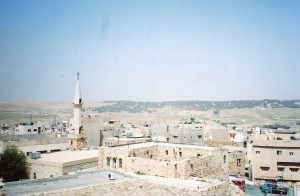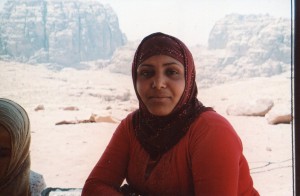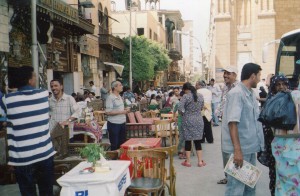I found the Middle East a dangerous place to travel in. The people are so warm, and the cultures so ancient, rich and diverse, that it’s an easy region to fall in love with. But it can also cause you heartache because many of the corrupt governments, feeding off their land’s natural resources, hoard the wealth. They do little to improve schools and infrastructures, and they keep most of their people poor.  I was there in 2007, a bit before the Arab Spring’s hopes for change, and the subsequent difficulties that new governments have had cohering. Instead, old political status quo’s have often asserted themselves more violently than ever. While I was in my hotel lobby in Amman, Jordan, a video played on the TV with a plea for peace. Understanding it can help heal this region and bring it back to its better nature.
I was there in 2007, a bit before the Arab Spring’s hopes for change, and the subsequent difficulties that new governments have had cohering. Instead, old political status quo’s have often asserted themselves more violently than ever. While I was in my hotel lobby in Amman, Jordan, a video played on the TV with a plea for peace. Understanding it can help heal this region and bring it back to its better nature.
A young man stood alone in the desert. He was smiling and singing, looking up to the clear sky which beamed with the sun’s radiance. His long white gown and the sands he stood on looked pure.
The scenes then changed to soldiers in combat, then to a family quarreling vehemently, and then to a business meeting of dour men that I wouldn’t buy a used car from.
But the three scenes were then shown in reverse, as though all people, with their divisive mentalities, were being brought back to their most basic roots.
The scene changed back to the man singing in the desert. Now all the other people were walking towards him in separate lines. They converged on him, became one group, looked up to the sky and sang together.
I found the video so powerful that I was fighting back tears in the crowded lobby. It blended several currents that are common in the Middle East.
1. Though Westerners often think of the desert as a remote and exotic place, it often stands for purity in many Middle Eastern cultures. Nothing is between people and the sky, with the all-powerful sun, and God, who created it all. Mosque architecture expresses this sensibility.
2. The human community together, enjoying intimacy between family and friends, and extending it to travelers–including me.
This blend of simplicity, unity, glory and the closely knit human community is a key aspect of Middle Eastern culture. Today’s desperate economic situations (The Economist magazine warns that Egypt might be on its way to becoming a failed state–the government lacks money to buy enough wheat for its people) and history of exploitation make it easy to forget the ancient roots of this region and focus on the divisive present–mainly a gift from greedy governments and American and British oil hogs and arms sellers. But these currents engendered the Bible, the Quran, and the Mishnah, and one of the world’s most fertile and influential cultural landscapes.
Will this vision of unity, glory, sacredness and human intimacy be realized by all in the Middle East? That depends on how many people appreciate the ancient ideals–please remember them and share them.



{ 1 comment }
Like the writing!
Like other culture, Middle East has two kinds of people, good and bad. The former create and practice the vision of unity, glory, sacredness and human intimacy while the later trample on them. If the majority become the later, they can ruin them.
Comments on this entry are closed.